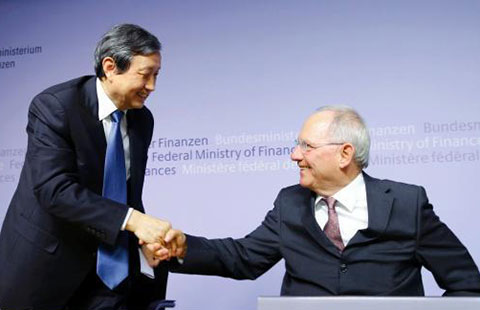Tectonic shifts hit traditional lenders
By Jiang Xueqing (China Daily) Updated: 2015-04-02 08:33"We will explore closer cooperation with the ICBC e-commerce platform and provide integrated services during the entire process of online home buying, online payment and online finance," Yu said. "We hope that our sales on the platform will exceed 10 billion yuan this year."
Zhang Yue, a principal at The Boston Consulting Group, said: "For commercial banks, building an e-commerce platform is a way to explore new channels to acquire customers and sell products, rather than enter an entirely new business area in hopes of quickly making high profits."
Depending on their goals, banks can hire e-commerce specialists to run such platforms or just use these platforms as "laboratories" for experimenting with new ideas, she said.
Mid-sized lenders are also seeking a technology-driven transformation.
China Merchants Bank Co Ltd is building an integrated Internet finance architecture that will feature "platform, flow and big data" to transform its business model.
As of Dec 31, the number of customers for its retail e-banking service had reached 36.13 million, with a total of 1.33 billion logins. The number of mobile banking logins amounted to 749 million.
The bank is also promoting its Small Business E Home, a platform providing financial services including credit ratings, lending and asset management via the Internet for small and medium-sized enterprises. As of Dec 31, the platform had 538,000 registered members. Logins reached 1.1 million in 2014.
Many bankers said they believe that the major competition for banks in the future will come from mobile interconnections. Cao Guoqiang, vice-president of China CITIC Bank Co Ltd, said the bank will increase its investment in mobile banking this year.
"We aim to integrate the online and offline features of all of our businesses except for cash withdrawals, so that we can acquire customers through all channels," Cao said.
This year, China CITIC Bank will launch direct banking services and build online-to-offline "smart communities" to expand and improve its platform for direct sales of wealth management products.
Beyond offering simplified and standardized financial services, the bank will step up cooperation on products and channels with e-commerce platforms, telecommunications operators and third-party payment service and data providers.
Despite the efforts by many banks, the reality is that transforming a traditional lender's business model and its mindset from offline to online is not going smoothly in some cases.
The core founders of Xiaoma Bank, an online wealth management platform that was launched by Baoshang Bank Ltd last year, have already left the institution and formed their own company that uses the Internet to provide personal wealth management.
Zhang Cheng, former general manager of Xiaoma Bank, said that he wanted to have his own business and the existing management system of traditional banks restrained innovation.
- Support measures give boost to market
- Tectonic shifts hit traditional lenders
- Deposit insurance a 'solution for failing banks'
- Business travel to see robust growth this year
- Top 5 features of China's property market
- China's home price decline slows in March: surveys
- Local govt bonds get huge boost
- Manufacturing activity rebounds during March

















